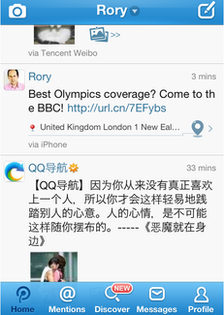Romford - China's social media base
- Published
- comments
Rory Cellan-Jones looks round a Chinese Olympic media hub in Romford
It's not quite what you expect to find in Romford. In a shabby building which was once a youth club in the Essex town, we found dozens of Chinese technicians and a state-of-the art television studio. This is the Olympic headquarters of Tencent, a Chinese internet superpower.
Every evening, China's gold medallists - and there is a plentiful supply - are driven to Romford from the Olympic venues to take part in a television programme broadcast on the internet. They are joined by their families - either in person or via an internet video call. To watch a weightlifting gold medallist meet her father for the first time since her victory was to understand that a lot of nonsense has been talked about Chinese athletes being robotic and unemotional.
I asked one of the producers how they could be sure that every single one of China's gold medallists would agree to pitch up in Essex to take part in the show. "We have an agreement with the Olympic team," I was told. Then I realised just how powerful the company running this operation must be.
Tencent brings news and social networking to hundreds of millions of Chinese consumers. Its properties include the QQ website and instant messaging service - by some measures the world's largest - and a Twitter rival Tencent Weibo, which claims to have over 300 million active users. According to Paidcontent, which ranked the Chinese firm 9th in its list of the world's most powerful digital media companies, Tencent earned over $4 billion last year, external.

As we filmed in the Romford studio, members of the Chinese production team were eager to show just how advanced their social media platform is. They gathered around me with their iPhones and iPads (Apple seems to be doing good business with Tencent employees) and persuaded me that I needed to be a member of Tencent Weibo.
Once they had ushered me through the security process and logged me on, one thing struck me - apart from the fact that I would need to brush up on my Mandarin to get very far. Unlike Twitter, this Chinese micro-blogging site has very prominent banner adverts streaming across the top of its mobile site. Tencent's Olympic programmes are heavily branded with the name of a global consumer brand, and it is evident that the whole business is focussed on delivering revenues as well as audiences.
The Weibo service, which was only launched a couple of years ago, looks to have some very sophisticated features - my new friends in Romford showed me how to blow on the phone and be transported to some random location on the map. Of course, what it does not offer is the freedom to say whatever you want - its founder has said in the past that he welcomes the government's efforts to regulate and censor the internet.
My afternoon in Romford provided an entertaining and instructive crash course in what the future of internet businesses may look like. With Chinese companies gaining huge audiences who are rapidly growing accustomed to sophisticated homegrown services, we may have to look to Shanghai, not Silicon Valley, for the next social media sensation.